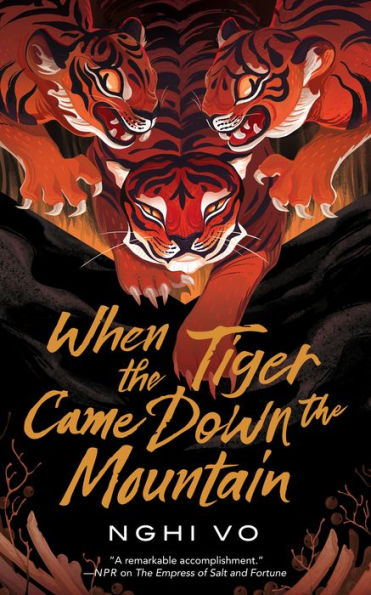There was a moment toward the end of The Empress of Salt and Fortune where Chih learns the truth about the new empress when I realized just how supremely talented Nghi Vo is. I experienced that realization again in When the Tiger Came Down the Mountain, the second book in her Singing Hills Cycle, with the resolution of the story of the foxes. Tiger proves that all the praise thrown her way is warranted.
As with Empress, Tiger begins with Chih, a monk collecting stories as they journey across the Ahn Empire. Having left Rabbit’s village, and with Almost Brilliant (their hoopoe traveling companion) off to raise fledglings, Chih is alone. Well, not alone for long. They contract with Si-yu, a rough-and-tumble heir to a dynasty of mammoth riders, to take them over a dangerous mountain pass.
Si-yu doesn’t tell her own long-winded stories, but what she says, coupled with Chih’s internal addendums, fill out more of the vast history of Ahn. But it’s not just the nation whose stories are revised. For the reader, Chih is our only example of a monk, but as Si-yu points out, they aren’t the ideal model. Life on the road has forced Chih to compromise on the rules and regulations. Their own story is full of revisions and edits and cuts.
Buy the Book


When the Tiger Came Down the Mountain
Partway up the pass, Chih and Si-yu are cornered by three tiger sisters. Hoping to persuade the tigers to spare their lives, Chih offers to tell the story of the tiger Ho Thi Thao and the Scholar Dieu, with the understanding that the sisters will correct any inaccuracies. And so the novella grows, the pieces coming together to create both an intimate portrait of a tigress and her human lover and a hazy landscape of life in Ahn.
In Empress, Chih wanted to uncover the truth about Empress In-yo, but in Tiger, what is truth and what is fiction are blurred to the point of irrelevance. The history Chih knows was passed down by human storytellers, so of course it centers Dieu and puts her in a favorable light. To humans, Dieu is the hero and Ho Thi Thao the villain. The tigers see it differently. They focus on Ho Thi Thao’s side of the story while making it clear that Dieu was no innocent maid taken advantage of by a wily animal. But even within their version, each tiger sees the truth slightly differently.
Ultimately, there is no “truth” and there is no “fiction;” there is only truth as fiction and fiction as truth. Empress In-yo forged her own version of the truth, and only clerics like Chih and partners like Rabbit knew what she had buried. In Tiger, all of the versions of Ho Thi Thao and Scholar Dieu’s story are simultaneously true and untrue, fiction and nonfiction, reality and fairytale. There is no victor to decide what is history and what gets left out, only people trying to make sense of a world that has no room for them. Every character in Tiger, from those telling the stories to those whose stories are being told, struggle with how others see them, how they see themselves, how others will remember them, and how they want to be remembered. Even Ahn is subject to these contradictions. The very ways in which Dieu and Ho Thi Thao experience and interpret the empire and its culture and traditions reveals not just the history of the land but the ways in which the land has shifted and adapted and disguised and hidden away parts of itself over time.
It would be so easy to map this series out against a Western framework. The Singing Hills Cycle isn’t just free of Eurocentric constraints, but actively pushes against them. Queerness – in sexual, romantic, and gender identity – exists by not existing. By that I mean that there is no cishet versus queer. People are people. They express themselves in whatever way best suits them and their needs. Diversity is the template. No one comments on two women being lovers anymore than they would a woman and a man. Chih is nonbinary, but it isn’t a plot point or topic of conversation. No one hems and haws over grammar or intentionally misgenders them. That’s not to say Ahn is free of bigotry and prejudice, but it’s so refreshing to have a world in which the white cishet patriarchy isn’t the default.
When the Tiger Came Down the Mountain is a nearly perfect example of a novella done well, where the author truly gets the medium, how to work within its structure while also expanding beyond its limits. As much as I love dipping into Ahn, Vo knows exactly how much to give the reader and when enough is enough. The concept is deceptively simple, yet the execution is lush and rich and subtly complicated. Nghi Vo is an author to watch.
When the Tiger Came Down the Mountain is available from Tordotcom Publishing.
Read an excerpt here.
Alex Brown is a librarian by day, local historian by night, author and writer by passion, and an ace/aro Black person all the time. Keep up with her on Twitter, Instagram, and her blog.










